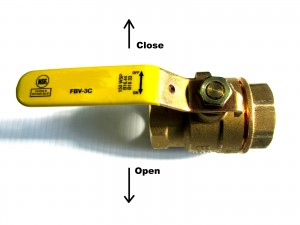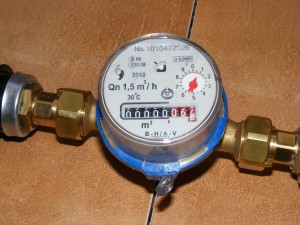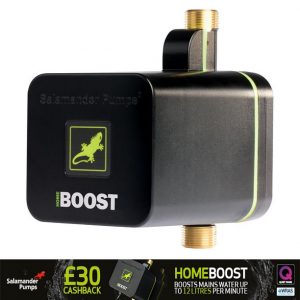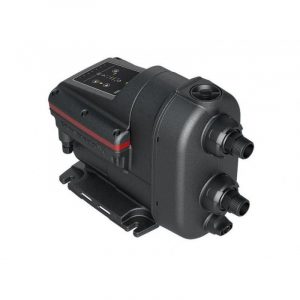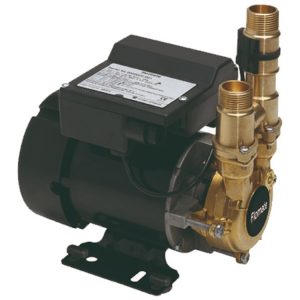How to Fix Low Water Pressure in Your House (Expert Guide)
The morning shower lacking any real pressure? Bathtub taking hours to fill? Or maybe you’re dissatisfied with the inadequate performance from your combi boiler?
Then you, like millions of others across the UK, might be experiencing low water pressure.
Fortunately, the good news is that you don’t have to continue living this way. The cause of low water pressure in the home is often quite simple, and you may not even require a plumber to fix the problem.
In this guide, you will learn:
- How to diagnose the cause of low water pressure
- How to fix low water pressure in the home
- When you should call a plumber
What causes low water pressure in the house?
If you are experiencing issues with water pressure throughout your home, then you may have one of the problems outlined below.
Most of these problems can be fixed quite easily, but for others, you may need to contact a plumber.
Obstructed Shutoff Valve
If you’ve just bought a new home or recently had building work conducted on your property, there is a chance that your water valves were not fully opened.
If the water valve is partially closed, then you may be restricting the amount of water entering your home. To fix this, simply ensure the valve is fully open.
If the valve appears fully open but you are still encountering reduced water pressure, then the valve may be broken. If this is the case, do not under any circumstances try to fix it without proper training.
Often found under your kitchen sink, a water valve will usually look like a bright yellow handle.
Again, if you believe the water valve is broken, contact a plumber immediately.
Leaks in Your Water Pipes
Leaks are the worst-case scenario when it comes to low water pressure.
If the water pipes are damaged, then this will cause low water pressure, as not all the water will make it to your taps.
After you’ve checked to see if the valve is fully open, you can conduct a leak check of your home. Now, this may seem scary, but it is actually quite simple.
Follow these simple steps:
Step 1: Check that the kids don’t need an immediate shower
Step 2: Close your main water valve and take a reading from the water meter
Step 3: After two hours, check the reading on the water meter. If the figure on the meter has increased, then you probably have one or multiple leaks
Your water meter will look something like this:
You will usually find the water meter:
- In the path outside your home
- In a box on an outside wall
- Inside your home: either under the sink, in a cellar or a downstairs toilet
Clogged Water Pipes
Clogged water pipes are one of the most common causes of low water pressure.
These clogs usually build-up when your home is supplied water via iron pipes. Iron is particularly vulnerable to rusting which can then break off and cause an obstruction within your system. You also face the problem of things like dirt, gravel or sand entering creating mineral deposits which further block water flowing from the mains water supply.
Unfortunately, if you suspect that clogged pipes may be restricting your water supply, then you will need to contact a plumber.
In this situation, you will either need to have your pipes removed and cleaned or in more severe cases, you could require a new set of water pipes.
Designer Taps
Designer taps look fantastic, but are they built to be efficient in your plumbing system? Modern taps are built for modern homes and they often have lower flow rates that are specifically designed for use within high-pressure systems.
Our advice is to weigh up the pros and cons. What do you value more, a stylish showerhead or a long, refreshing morning shower?
A Weak Pump
Regular maintenance checks are advised to ensure your pump is working at optimum capacity.
If your pump is over two years old, then one of two things may be happening. Either your pump is malfunctioning, or it just isn’t powerful enough for your needs.
With millions of people right across the UK complaining about low water pressure, we suspect that most homes are simply using malfunctioning or improper pumps.
How to Fix Low Water Pressure in Your Home
Install a Water Pressure Booster Pump
If the issue is simply that the mains water pressure supply is too low, the simplest fix is to invest in a booster pump. Found in homes of all shapes and sizes, booster pumps are a relatively cheap option to add extra pressure to your home.
Designed to increase water pressure by passing water into the pump from your mains supply and then ejecting it into your home water system at a higher pressure, a booster pump is a truly simple and effective solution to increasing water pressure.
Note: It is illegal to add a booster pump directly to mains water pressure. The added pressure created by a booster pump can damage mains pipework. In most cases, you will need to insert a break tank.
How much will this cost?
Cost - £100 to £500
Installation - Plumber
Replace Water Pipes
If the issue is clogged or leaking water pipes, then you may need to completely replace your piping. As you can imagine, this can get quite expensive and will entirely depend on the size of your home and the number of pipes that need replacing.
How much will this cost?
Cost - N/A
Installation - Plumber
Best booster pumps for low water pressure
If you’re considering purchasing a booster pump. then there really is only a handful of pump brands worthy of your time. These are Grundfos, Salamander and Stuart Turner.
Here is the top booster pump from each brand:
Salamander Home Boost 1.6 Bar Mains Water Pressure Booster Pump 240V
One of the leading options for correcting low water pressure is the Home Boost range from Salamander pumps. These pumps can raise your water pressure to around 1.5 bar whilst still ensuring you stay compliant with water-use and installation regulations. They are compact and easy to install and quiet in operation too so that they don’t disrupt your home with extra noise.
Grundfos Scala2 3-45 Variable Speed Home Booster
Another leading option is the Variable Speed Home Booster range from Grundos. The SCALA 2 is a fully integrated, self-priming system that is ideal for boosting water pressure in domestic applications. Integrated speed control also means that the pump will only operate when it’s needed, so it won’t hit your energy bills either. This pump must be used in conjunction with a break tank.
Stuart Turner Flomate Mains Boost Extra 200
Stuart Turner’s Flomate range is one of the finest pump collections on the market. Designed to be connected directly to the incoming mains, Flomate Mains Boost Extra is fully compliant with UK water regulations. The 3 bar of pressure will give a deserved boost to your water supply, while the tech also comes with an integrated break tank which removes the need for inserting a separate cold water break tank.
When should I call a plumber about low water pressure?
So if you read this article thoroughly, you should be able to take the first steps to diagnosing your water pressure issues.
If you’ve found the problem, then you should also know how to go about fixing that issue.
If you are still unsure, then scan the following list of topics to see if you can identify your problem. Please note that all of the issues detailed below will require the attention of a qualified professional.
Dripping Taps
At first glance, it might not seem like a massive issue, but a dripping tap can have a major impact on your bank account.
Over the course of a year, a dripping tap can cause you to flush hundreds of gallons of water down the drain, along with a sizeable amount of money.
It may seem like a simple, easy task to replace a washer or two, to create a water-tight seal, but due to the technical requirements of each tap, the job is best left to a trained professional.
Clogged Pipes
Be it your sink, toilet, bathtub or drain – if it has a pipe connected to it, it can get blocked.
Determining if a water pipe is clogged is a complex job for a plumber but so is fixing the issue.
In the best case scenario, a plumber may best-case have to go through and remove all the piping before cleaning and making small repairs.
In the worst case, they may need to replace all of your water piping. Again, due to technical aspects of ensuring your pipes are safely removed and refitted, the job is best left to a trained professional.
Broken Water Valve
A broken water valve is another common plumbing problem that may be causing low water pressure in your home. Now it may seem like an easy fix; replace the old valve with a shiny new one and you’re done, right? No. Water valves are connected to the mains water and removing them can be a complicated job with disastrous consequences if you get it wrong. Definitely leave this job to a professional.
Leaking Pipes
Water leaks can be costly, so looking after your water system correctly should be a priority. Even if a leak is relatively minor, it may still cause serious damage over time, along with a costly impact on your bank balance. To save yourself from damaging your property further, ensure that finding and repairing leaking pipes is left to a professional.
Looking for a plumber in your region? Check out our average price for a plumber article here.
Free Advice
If you’re struggling for advice, ring our dedicated pump experts for free advice on 0800 112 3134 or 0333 577 3134.
We’re open Monday to Friday 07:00 - 17:30 and Saturday 08:30 - 12:30.


